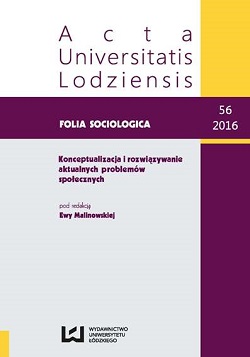Besieged fortress syndrome? Occupational group of physicians and medicine students and the problem of social reception of health care system in Poland
DOI:
https://doi.org/10.18778/0208-600X.56.08Keywords:
physicians, occupational group, trust, besieged fortress syndrome, public opinion, opinia publicznaAbstract
The paper refers to the problem of decline in public confidence in health care system in Poland. Impartial reports prove that mass media are keen on showing medical mistakes, corruption as well as other thrilling news. The memorable case of “skin-hunters” from Lodz seems to be a good example. This may create the critical public opinion on functionaries of health care system (especially on physicians). Surveys by CBOS show that many of Poles reckon that doctors are incompetent, do not interested in their work and unfair when treating patients. Malevolent public opinion and “scandal-oriented” media coverage should create an hostile environment for functioning of specific occupational groups in health care system. Does it lead to besieged fortress syndrome (meaning consolidation and mobilization of an own professional group, described as not guilty, but unfairly treated by inimical social/institutional surrounding)? In the paper – in the formula of case study – results of own survey among group of 151 physicians from Lodz and 228 students of Faculty of Military Medicine at Medical University of Lodz are investigated. The aim of the research was to identify opinions of physicians and medicine students on how medical occupations were perceived by Polish society. The collected empiric material allowed (at least partially) to verify the hypothesis of besieged fortress syndrome.
References
Bailey K. D. (1994), Methods of social research, The Free Press, New York.
Google Scholar
Corruption (2012), Special Eurobarometer 374 report, http://ec.europa.eu/public_opinion/archives/ebs/ebs_374_en.pdf (8.09.2015).
Google Scholar
Cybulska A. (2013), Prestiż zawodów, CBOS report No. 4922.
Google Scholar
Cybulska A., Pankowski K. (2014), Stosunek do instytucji państwa oraz partii politycznych po 25 latach, CBOS report No. 5007.
Google Scholar
Gałuszka M. (2003), Społeczne i kulturowe powinności medycyny. Tożsamość zawodowa i atrofia moralna, Wrocław Scentific Assiociation, Wrocław.
Google Scholar
Gałuszka M. (2010), Modernizacja systemu opieki zdrowotnej w Polsce a problem komercjalizacji szpitali przez samorządy terytorialne, [in:] M. Gałuszka (ed.), Modernizacja biomedyczna społeczeństwa a ryzyko zdrowotne, Medical University of Łódź, Łódź.
Google Scholar
Gałuszka M., Legiędź-Gałuszka M (2008), Medycyna i zdrowie w społeczeństwie ryzyka, [in:] M. Gałuszka (ed.), Zdrowie i choroba w społeczeństwie ryzyka biomedycznego, Medical University of Łódź, Łódź.
Google Scholar
Hall M. A., Camacho F., Dugan E., Balkrishnan R. (2002), Trust in the Medical Profession: Conceptual and Measurement Issues, “Health Services Research”, No. 5, s. 1419–1439.
Google Scholar
DOI: https://doi.org/10.1111/1475-6773.01070
Hall M. A., Dugan E., Zheng B., Mishra A. K. (2001), Trust in physicians and medical institutions: what is it, can it be measured, and does it matter?, “The Milbank Quaterly”, No. 4, s. 613–639.
Google Scholar
DOI: https://doi.org/10.1111/1468-0009.00223
Hibbard J. H., Weeks E. C. (1987), Consumerism in health care: prevalence and predictors, “Medical Care”, No. 11, s. 1019–1032.
Google Scholar
DOI: https://doi.org/10.1097/00005650-198711000-00001
Hipsz N. (2014), Opinie o funkcjonowaniu systemu opieki zdrowotnej A.D. 2014, CBOS report No. 5046.
Google Scholar
Kobylińska A., Makowski G., Solon-Lipiński M. (red.) (2012), Mechanizmy przeciwdziałania korupcji w Polsce. Raport z monitoringu, The Institute of Public Affairs, Warsaw.
Google Scholar
Majewski P. (2007), Raport na temat korupcji w polskim systemie ochrony zdrowia, www2.mz.gov.pl/wwwfiles/ma_struktura/docs/rnkpsoz_21062007.pdf (8.09.2015).
Google Scholar
Mechanic D. (2003), Physician Discontent. Challenges and Opportunities, “The Journal of the American Medical Association”, No. 7, s. 941–946.
Google Scholar
DOI: https://doi.org/10.1001/jama.290.7.941
Moore P. J., Adler N. E., Robertson P. A. (2000), Medical malpractice: the effect of doctor-patient relations on medical patient perceptions and malpractice intentions, “The Western Journal of Medicine”, No. 4, s. 244–250.
Google Scholar
DOI: https://doi.org/10.1136/ewjm.173.4.244
Omyła-Rudzka M. (2014), Opinie o błędach medycznych i zaufaniu do lekarzy, CBOS report No. 5104.
Google Scholar
Stempień J. R. (2013), Civic monitoring of health service in Poland among the activity of nongovernmental organizations, [in:] conference materials of the International Scientific Conference “Historical, economic, social, philosophic and educational aspects of health service development”, National Medical University, Kharkiv, s. 112–114.
Google Scholar
Study on Corruption in the Healthcare Sector (2013), European Commission, http://ec.europa.eu/dgs/home-affairs/what-is-new/news/news/docs/20131219_study_on_corruption_in_the_healthcare_sector_en.pdf (8.09.2015).
Google Scholar
Studzińska-Pasieka K. (2008), Profesja lekarska w społeczeństwie ryzyka biomedycznego, [in:] M. Gałuszka (ed.), Zdrowie i choroba w społeczeństwie ryzyka biomedycznego, Medical University of Łódź, Łódź, s. 140–179.
Google Scholar
Wenzel M. (2004), Zaufanie do instytucji publicznych w krajach Europy Środkowej i Wschodniej, CBOS report No. 3214.
Google Scholar
Wizja świata – emocje wyzwolone. Co mają nam do zaoferowania cztery najpopularniejsze telewizyjne serwisy informacyjne?, http://www.press.pl/raportypdf/www-data/wizja_sw_emo_w_r_imm.pdf.pdf (8.09.2015).
Google Scholar
www.nil.org.pl (The Polish Chamber of Physicians and Dentists).
Google Scholar
www.sppnn.org.pl (Polish Patients Association Primum Non Nocere).
Google Scholar
Zajdel J. (2008), Ryzyko zdrowotne implikowane błędami lekarskimi, [in:] M. Gałuszka (ed.), Zdrowie i choroba w społeczeństwie ryzyka biomedycznego, Medical University of Łódź, Łódź, s. 349–386.
Google Scholar
Ziółkowski J. (2013a), Paradoksy syndromu oblężonej twierdzy w reżimach niedemokratycznych, [in:] J. Ziółkowski (ed.), Paradoksy polityki, Vol. 2, Elipsa, Warsaw, s. 12–137.
Google Scholar
Ziółkowski J. (2013b), Wrogość w stosunkach politycznych. Modelowa analiza funkcjonalna, Elipsa, Warsaw.
Google Scholar
Downloads
Published
How to Cite
Issue
Section
License
Copyright (c) 2016 © Copyright by Jakub Ryszard Stempień, Marcin Tkaczyk, Łódź 2016; © Copyright for this edition by Uniwersytet Łódzki, Łódź 2016

This work is licensed under a Creative Commons Attribution-NonCommercial-NoDerivatives 4.0 International License.










